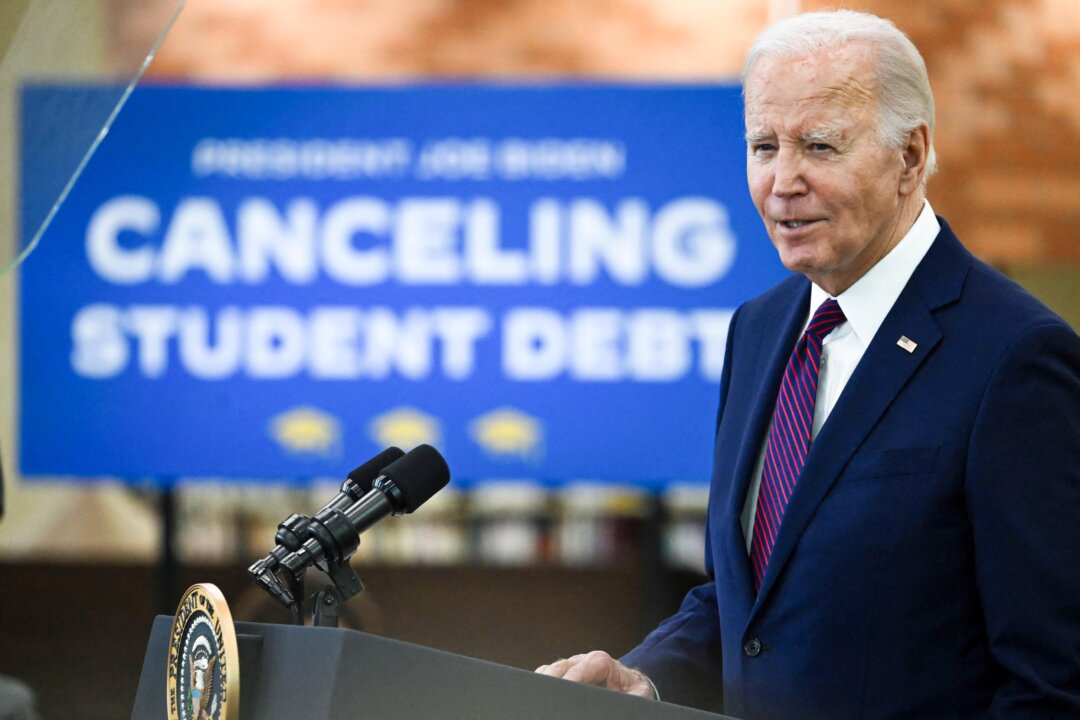The threatened injury outweighs the harm that a block would cause the government, U.S. District Judge Matthew Schelp said.
A federal judge on Oct. 3 blocked President Joe Biden’s student loan cancellation plan, one day after a different judge said he would not extend a block on the program.
U.S. District Judge Matthew Schelp, citing an earlier appeals court decision in a case against a separate loan cancellation plan, said that plaintiff states that sued over the program will be irreparably harmed if he did not enter a preliminary injunction against it as the case moves forward.
“And plaintiffs are likely to succeed on the merits in showing that defendants’ actions would be unlawful, like every court reviewing the previous plans to unilaterally erase it,” Schelp said. “Balancing the harm and the injury, merged with the public’s interest, easily leads this court to the conclusion that preliminary injunctive relief should issue. The public has an immense interest in its own government following the law.”
The judge also said that allowing the Biden administration to implement the program before the case is decided would enable officials to evade judicial review for the plan.
The order blocks the administration from implementing a plan that would forgive interest of up to $20,000 each for borrowers who owe more than they owed when they first took out loans, and cancel debt for undergraduate borrowers after 20 years and graduate borrowers after 25 years.
States say the cancellations were set to secretly start on Sept. 3 and that the program would result in the cancellation of hundreds of billions of dollars in student debt. Courts previously blocked two student debt relief plans offered by Education Secretary Miguel Cardona.
Administration officials say they were preparing to forgive student loans but that they were still taking preparatory steps before issuing a final rule detailing the new program. Because the states challenged an action that was not final, officials said in court filings, the case should be thrown out and the request for a preliminary injunction should be denied.
A temporary restraining order was imposed on the plan by a federal judge in Georgia. That same judge on Oct. 2 declined to extend the order, dismissed Georgia as a plaintiff because he said the state only offered speculative harms, and moved the case to Missouri.
Schelp said he agreed with the rationale in the restraining order, which concluded that the plaintiffs have standing, have shown that they will likely succeed in their case, that they will suffer irreparable injury unless the program was blocked, and that the threatened injury outweighs the harm that a block would cause the government.
“Plaintiffs show a substantial likelihood of success on the merits given the Rule’s lack of statutory authority, and the Secretary’s attempt to implement a rule contrary to normal procedures,” U.S. District Judge J. Randal Hall wrote on Sept. 5 as he entered the block. “This is especially true in light of the recent rulings across the country striking down similar federal student loan forgiveness plans.”
Missouri Attorney General Andrew Bailey said in a statement on the new ruling that the judge “rightfully recognized Joe Biden and Kamala Harris cannot saddle working Americans with Ivy League debt.”
A spokesperson for the Department of Education told news outlets in a statement that the agency was disappointed in the ruling.
“We will continue to vigorously defend these proposals in court,” the spokesperson said. “We will not stop fighting to fix the broken student loan system and provide support and relief to borrowers across the country.”

